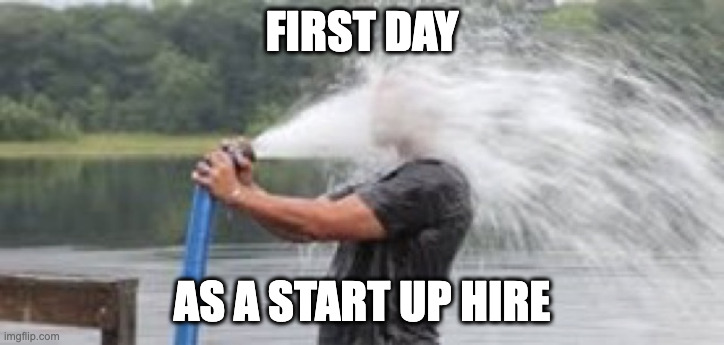The Start-up Grind
The Start-up Grind
Lessons from speed, burnout, growth, and survival
I can see why working at a start-up has its appeal.
You're working on something new. Things move fast. It feels exciting. There's opportunity to touch a wide range of areas—product, infra, security, platform, you name it. And on top of that, you might even retire as a side effect.
Great!
Except... it's not for everyone. And it comes with nuances that can completely shape your experience.
Hitting the Ground Running
Onboarding at a start-up usually feels like this:

Some people (like myself) get lucky with a decent, gradual ramp-up. A chance to learn the system, explore the landscape, absorb.
Others? They get dropped into a queue of Jira tickets with the expectation to ship fixes by the end of the sprint.
Acclimating happens fast—which is good.
Start-up life has a strange pace: you settle in before you realize you're settling in. After a few weeks, things click. You're moving. You're learning. You're building.
And you start noticing what really matters: your coworkers.
- The ones who drop what they're doing to help you debug something
- The ones who push back when it counts
- The ones who aren't afraid to speak up
The Growth Path
You will grow—fast.
New skills. New challenges. Constant fire.
But eventually, the learning curve levels out.
The challenges plateau.
Your motivation dips.
When that happens, it's time for a conversation with yourself:
Do you need a change of scenery inside the company—maybe a new team, a fresh project?
Or is it time to go?
Looking back, I wish I'd been braver about leaving sooner.
It's not an easy decision. Sure, there are some common rules of thumb. But honestly? Everyone's threshold is different.
It becomes a gut feeling.
Listen to yourself.
Be brave enough to make the hard calls.
You won't regret betting on yourself.
When You Disagree
You won't always align with the company's goals, roadmap, or priorities. That's normal.
If you feel safe doing so, speak up.
Ask your manager to walk you through the "why." You might learn something you didn't see before.
But if disagreements start piling up—and they begin to weigh on you—talk it out with coworkers you trust.
Having a support system isn't optional. It's essential.
Start early. Stay consistent.
Politics, the Necessary Evil
I used to think start-ups were immune to office politics.
That the speed, the chaos, the meritocracy would override it all.
I was wrong.
Politics exist—even in lean, fast-moving teams.
And knowing how to navigate them is an underrated skill.
You have to be a diplomat.
Because one day, you might run into a manager who misunderstands your work or underplays your impact—and that can still lead to fallout.
The reality is that leadership misalignment happens. And when it does, it can quietly chip away at trust, morale, and engineering culture if it goes unchecked.
That's why diplomacy, communication, and self-awareness matter just as much as code.
Always Be Ready
As much as I hate the analogy, working at a start-up is like being at war.
You don't always know who the enemy is—or where they are—but you know they're out there.
So:
- Be ready for layoffs
- Be ready for leadership shake-ups
- Be ready for the company to run out of money
There will always be early signs. Learn to read them.
It'll save you a ton of stress. I promise.
Final Thoughts
Start-ups are amazing for learning fast, getting exposure, and making a dent—even if that dent disappears 5 to 10 years later.
What matters is what stays with you.
Your experience.
Your scars.
Your growth.
And your relationships.
Seriously—cultivate your relationships.
Find people you can vent with, laugh with, grab beers with. The people who remind you you're not alone. That kind of support system is gold.
Also? Be a diplomat.
Even when it feels exhausting or fake or slow. It can open doors—or help you exit gracefully when the time comes.
Never underestimate the power of words.